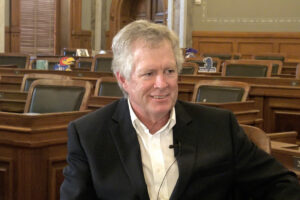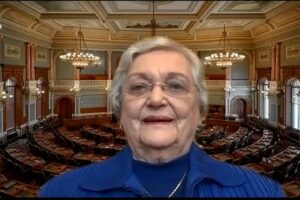
Interview of Dennis McKinney, August 23, 2019
Interviewed by Dale Goter
Dennis McKinney developed many insights in his sixteen years as a leader in the minority party into how the legislature did work, and how it should work. He recounts numerous instances when things worked well because of bipartisan cooperation and compromise. McKinney's experiences on the House Energy and Natural Resources committee working with Carl Holmes and Ken Grotewiel helped shape water policy in Kansas. His experience as a farmer and rancher in south central Kansas coupled with his focus on problem solving led to his reputation as a "middle of the road legislator" who would work Show Morewith both political sides as well as urban and rural. McKinney was committed to public education as well as conservation. The pursuit of fair and balanced tax policy shaped his actions. The interview highlights the importance of leadership from the governor's office and other legislative leaders (Mays, Shallenburger, D. Kerr, Morris). There is an interesting segment about the 2005 Special Session on school finance where McKinney talks about using the courts as leverage. The interview concludes with a brief discussion of the Greensburg tornado. Show Less

Interview of Ardena Matlack, April 8, 2021
Interviewed by Joan Wagnon
Ardena Matlack describes the Kansas House of Representatives in the 1970’s when so few women were in the Kansas Legislature. Additionally, her second term she experienced being in the majority as a Democrat—something that seldom occurred. While in the majority, she started on the Federal and State Affairs committee as Vice-Chair, and moved up to chair the committee the second year of her term. The committee dealt with the ERA, abortion, liquor and a host of controversial issues. She also served on the Judiciary committee. Her discussion of gerrymandering shows the difficulty in dealing Show Morewith reapportionment that led to her husband losing his Senate seat and encouraging her to run for the House. She also dealt with environmental issues and water issues, particularly in Sedgwick County. Matlack worked with Treasurer Joan Finney to get the first Unclaimed Property law passed. Show Less
